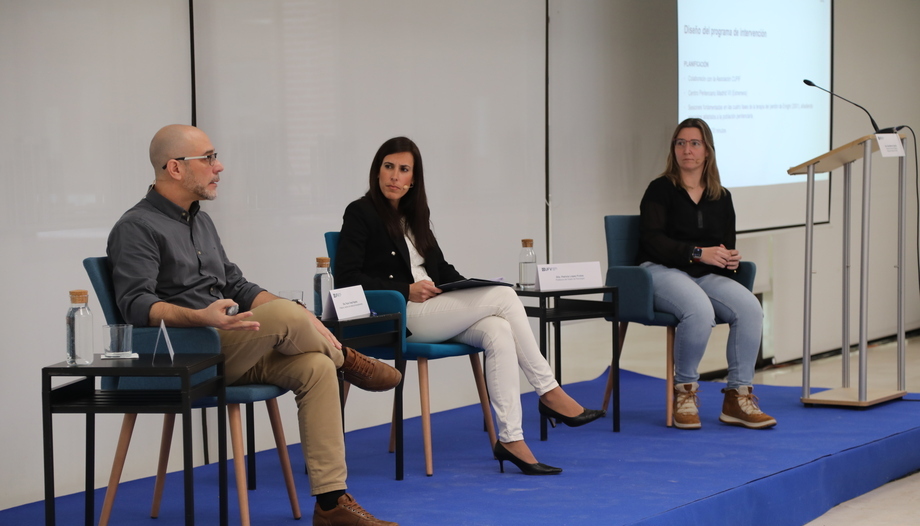Observers and analysts have often referred to the need for forgiveness as a means of resolving conflict, or in its aftermath, in the wake of terrorist violence, in isolated acts or over the years, and of course in the aftermath of wars and conflicts around the world.
On a personal level, and also in the family and social, even only from a strictly psychological point of view, no longer ethical or moral, the importance of forgiveness to achieve inner and outer peace has been underlined. Forgiveness, it has been said, improves physical and mental health, resentment and hatred corrode.
This week, the Francisco de Vitoria University (UFV) has presented the Forgiveness InstituteThis was "a pioneering initiative in the university environment, with a conference that analyzed the concept of forgiveness and explained how it works in specific projects," reports the academic center.
"The aim is to offer a space for research, training and knowledge transfer in the field of forgiveness," explained Dr. Clara Molinero, director of the Institute and of the Degree in Psychology at the UFV, who participated in the event together with Dr. María Prieto Ursúa, from the University of Comillas, Saray Bonete, researcher and professor of the Degree, and Robert Enright, pioneer of research in forgiveness in the USA, according to the University.
Multidisciplinary perspective
Clara Molinero explained that the initiative arises from "the need to explore forgiveness from a multidisciplinary perspective, with an open mind, including other disciplines such as psychology, education, philosophy, theology and sociology, among others".
"You can learn to forgive and ask for forgiveness, and who doesn't need to overcome a blockage or resentment for a wrong received? We are all potential recipients of the Institute, because it is not only aimed at helping patients with severe disorders, but everyone, because we all need forgiveness," said Jorge Lopez, dean of the Faculty of Education and Psychology.
"The main lines are the creation of measuring instruments that allow us to examine the changes after a work of learning to forgive; intervention work and on which we develop content and make the evaluation of the changes that occur," said the researcher Saray Bonete, who explained that they are working with prisoners, and also in schools and universities "to train university students in their professional work to use forgiveness as a strategy to resolve conflicts".
Emotional and psychological depth of forgiveness
The inauguration also served as a platform to discuss how forgiveness can be a powerful tool for emotional well-being and mental health. María Prieto Ursúa, author of the book "Forgiveness and Health", highlighted the complexity of the forgiveness process "especially when it comes to forgiving oneself after having committed acts that have caused significant harm to others".
Dr. Prieto identified three main components in the process of forgiving oneself: the assumption of responsibility, interpersonal reparation (although in some cases, this may be symbolic or not directly with the victim), and intrapersonal reparation, which involves deep work on how one sees oneself after the act committed.
In the context of wanting to ask the victim for forgiveness, Prieto stressed the importance of respecting the victim's wishes and needs, even if this means not having direct contact to ask for forgiveness. True care for the victim sometimes involves respecting established barriers, recognizing that the offender's need for forgiveness should not outweigh the victim's need for safety and comfort.
At other universities
The study of forgiveness has begun in the field of psychology in some universities, bien como un área de investigación de modo interdisciplinar en el marco de un órgano de más amplio contenido, en colaboración con expertos de otras entidades universitarias, o bien con un Instituto propio sobre el perdón, también interdisciplinar, como en el caso que comentamos de la Universidad Francisco de Vitoria.
In the University of NavarraThe study of forgiveness, for example, has emerged as an area of research that reveals its multifaceted influence on interpersonal relationships, mental health and emotional well-being, the academic center explains.
"There are studies that show that people who show a positive attitude towards forgiveness have less mental pathology, use less psychotropic drugs and have a higher tolerance threshold for pain and suffering. This means that they use fewer painkillers and even fewer health services," he wrote. Javier Schlatterspecialist of the Department of Psychiatry and Medical Psychology of the Clínica Universidad de Navarra in Madrid, in his book "Wounds in the heart. The Healing Power of Forgiveness".
In the field of CEU San Pablo UniversityMarcelino Oreja, one of the fathers of the Transition in Spain, who on October 5 last year, upon receiving the award, said that he received "with great emotion this recognition and I am very grateful for the date chosen; on this same day, but in 1934, my father was assassinated". "October 5 was marked every year in the family calendar to remember my father. My mother always instilled in me the feeling of forgiveness despite the pain caused."
It is not superfluous to recall that the French philosopher Remi Brague proposed "forgiveness" in the face of the spread of the woke culture of cancellation at the 2021 Congress of Catholics and Public Life.
– Supernatural Comillas University has different specialists in issues related to forgiveness, who teach at the university itself, and also do research with other academic centers, such as the aforementioned professor María Prieto Ursúa or the teacher Pilar Martinezamong others.









